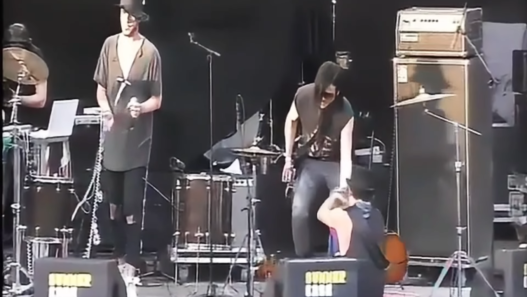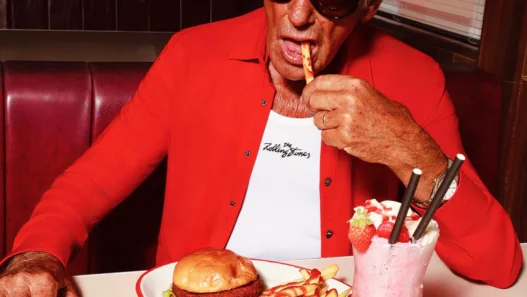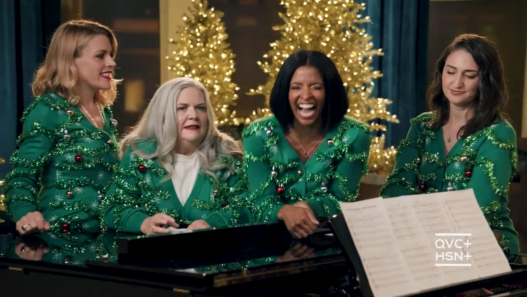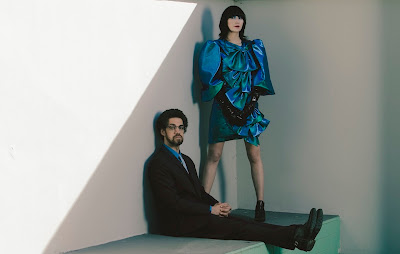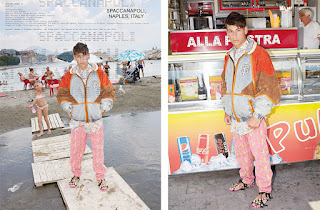Karen O and Danger Mouse just unleashed a euphoric and brilliantly refreshing new record. They chit-chatted about all that and much more like The indie rock dance scene revival from the early 2000s, Time Travel, Pink Floyd and Beyoncé!
“Karen O and Brian “Danger Mouse” Burton started making noise around the same time, with a similar irreverent zest. In the early 2000s, when Karen was rampaging around the world with the Yeah Yeah Yeahs, rocking fishnets-and-lipstick classics like “Maps” and “Y Control,” Danger Mouse rewrote the rulebook with his pioneering Jay-Z/Beatles mash-up, The Grey Album. So Lux Prima — a meeting of minds between the punk queen and the shape-shifting avant-funk producer — feels like the work of two kindred spirits. As Karen says, “Brian is as masculine as you get, but I just dragged him along my journey to the Divine Feminine.”
For Karen O, it’s her first full album since the YYYs’ excellent 2013 Mosquito, though the New York doll hasn’t exactly been low-profile since then. She’s sung at the Academy Awards, performing her Oscar-nominated “Moon Song” from Spike Jonze’s Her. Beyonce gave a new life to “Maps” on Lemonade, turning the the YYYs’ torch ballad into “Hold Up” (“they don’t love you like I love you”). And Karen has come into her own as a crucial influence on modern pop, not to mention spraying a mouthful of beer as the cover star of Lizzy Goodman’s best-selling oral history of the NYC post-9/11 rock scene, Meet Me in the Bathroom. Danger Mouse, meanwhile, has produced everybody from U2 to Adele to the Black Keys, always keeping everyone guessing what he’ll try next. Lux Prima is his first album as a lead performer since 2014’s After the Disco, made by his Broken Bells project with Shins singer James Mercer.
Karen and Brian talked to Rolling Stone about teaming up, cinematic sound, female energy, time travel, Beyonce, mourning Prince and Bowie, parrenthood, rebellion, and the timeless lessons of Pink Floyd.
Karen, this sounds different from anything you’ve done before. Where did this album come from?
Karen O: It all started with me drunk-dialing Brian, back in 2008. The Yeah Yeah Yeahs, we did one of those live television things with Beck, and Brian had just done Beck’s record [Modern Guilt]. I drunk-dialed him from Europe: “We gotta work together!” I had no recollection of this until he mentioned it. But we had been on each other’s radar for a while.
I hadn’t made music since Mosquito. I had my son, and then I really hit reset as a human being after that. Going into this record, we were just gonna see what happened in the studio together. No commitments, no ties whatsoever, no labels involved. No nothing. It was purely, “Yeah, let’s just make some music” — like a kid in a sandbox. And it ended up being an expedition.
Where did that expedition take you?
KO: So much feminine energy. Making rock music in a female-fronted band, being female in a male-dominated industry, I’ve just been wanting to get more in touch with the feminine side of myself — as a woman, as a mother, as a bringer of life. I was just feeling it.
That song “Woman” is really intense, emotionally. A “get your armor up” kind of song. Things were shifting out of control politically, from a feminist perspective, but instead of embracing fear, I wanted to embrace a kind of perseverance and get people riled up. That’s something I’ve always liked to do in my work — something to push against. The wave against my surfboard is people saying, “No, you can’t do that.” You think I can’t do that? I’ll fucking do this in your face, motherfucker.
In a way it goes back to the spirit of your earliest punk days, like when you sang “Our Time” in 2001.
KO: “Rebel outsider kids, unite!” Music is where I get to be that person. I’m a pretty shy, reserved, mild-mannered day-to-day person, but in that arena, that’s where I get to be Destroyer and Defender of All.
You’ve always avoided repeating yourself — you do these crazy projects and then move on fast. You even did an opera, Stop the Virgens.
KO: A “psycho-opera” — that what we called it. It might not have been the opera community’s vibe. But it’s part of my personality to take risks and be willing to fail even though that’s fucking terrifying. I have something in me that doesn’t allow myself to not do it, basically. I have this driving force to continue to push myself out of the comfort zone.
Right now, I’ve been doing it for about 20 years. The greatest currency of being an artist is getting to have the experience of the process, then put something out there in the world. There’s a lot of artists that have these dreams to do things, but something gets in the way and they back out. But if you get to have that experience, collaborating with people and trying something new together — that’s what I’m gonna be remembering on my death bed. Not the product, but the process.
How does parenthood change your perspective?
KO: It’s a total ego annihilator. That comfy rug gets pulled from under you, and you’re flying in the air until you land on your head. I’m not passing this with flying colors, by any means. I still don’t know what the fuck I’m doing at all. But I feel like I’m more aware of being a woman. More tuned in to the feminine side of me. Getting through my twenties — I don’t want to say sleep-walking, but I feel like my awareness was less.
That might be surprising to people because you’ve always had that fearless strut — the punk rock warrior queen.
KO: That was just my instinctual reaction. I have this access to a huge amount of strength, almost like super-strength — it’s almost overwhelming. It devoured me, right? I was always fighting to harness that, so it wasn’t able to control me. But I’m glad it appears that way from the outside, like I’m fearless.
I saw the Yeah Yeah Yeahs play a secret gig in April 2016, playing Bowie covers a few months after he died. It was for the premiere of your husband Barnaby Clay’s Mick Rock documentary [Shot! The Psycho-Spiritual Mantra of Rock]. It was the night after Prince died, so you and [TV on the Radio singer] Tunde Adebimpe did “When You Were Mine.” It was so cathartic.
KO: I gotta say, what religion is to a lot of people, music is for me. When Prince died, just being with each other and playing music together — it was one of the most healing, fortifying experiences. Like 9/11 happening to the city, the most traumatizing thing ever — that was just when we were coming up. We got to support each other through it by just taking it all and putting on the slab of the stage — like, “Here’s my fucking heart. Let’s do this together.” Music’s been there for me throughout my life like that, like nothing else.
Then the very next day, Beyoncé released an album called Lemonade, with her version of “Maps.”
KO: I was on the subway around that time. That Saturday night, I was still in the city, on a really crowded subway, and there was a girl listening to it and singing along with it. She had a good voice too, singing a capella. Just hearing her singing it on the subway — that’s a New York moment for me.
You want to write a song that keeps finding its way back to people. And when one of the biggest pop stars in the world wants to sing it? I was like, “Yeah!” [“Maps”] was one of the earliest ones that we wrote. It happened so nonchalantly. But something about that song resonated and managed to stand the test of time. That’s just awesome — to complete something and send it to sail out to the world.
It’s been almost 20 years since the first Yeah Yeah Yeahs gig. What’s it like to have friends now who grew up listening to your music?
KO: We’re all totally on the same page, just born at different times. There’s something enduring about the punk spirit. It’ll just keep going and keep going, even if it’s just wildly unpopular. They can’t get rid of it.
So, Brian, I hear that Karen drunk-dialed you ten years ago?
Danger Mouse: At first I was thinking, “Is it weird that she’s drunk? Because it’s three o’clock in the afternoon?” Then I realized she was in England and I was in L.A. But that was our first real long conversation about doing something together.
Something you and Karen have in common is that you don’t like to repeat yourself.
DM: It has to come from a sense of urgency. My sense of urgency probably comes more from something I would talk about with my shrink. But I think working with a lot of different people helps me to keep moving before I can slow down to think about things too much.
You’ve always seemed to mess with music from all over the map.
DM: When I was in college, I was in Athens, Georgia. So I got into the music scene there. And I was really interested in film and music, and I didn’t know how to do either one. But I felt like I could fake music easier. I grew up in the early Eighties, so there wasn’t that much hip-hop. I was getting New Wave on the radio, then eventually hair metal — I loved all that stuff. Then we moved to the South where it was all hip-hop and Miami bass and booty-shake and stuff like that. I was an art guy, I really liked drawing. And I thought music was entertainment. I didn’t want to be an entertainer. I didn’t want to be a performer, either.
I didn’t understand the concept of using music as an art form until I got to college and started hearing 15-minute Pink Floyd songs, or I’d see people in psychedelic bands. I discovered all the guitar bands around Athens, Georgia — the Elephant 6 stuff, R.E.M., the psychedelic adventurous music. It was catchy and melodic, but it was also way out there and different. At first I said, “That’s not gonna be on the radio,” then I realized, “Well, that’s not what they’re trying to do.” It definitely felt like a real collective of people trying to do something. But what they weren’t trying to do was achieve success at all costs.
I’m getting a little obtuse about it, but to get to Athens, Georgia in 1995, and see people who played guitar, just to put their heart and soul into it, not for the rewards — that was a discovery. That’s why I really love Pink Floyd. It’s the idea that you don’t have to have any song on the radio for it to mean something. I always just assume the stuff I do is not gonna get recognized as it happens. You just hope that someday, somebody’s gonna discover it and go, “This is great!” But you don’t have to worry about the popular thing. You can make a lot more music and more art if you don’t worry about it.
Karen says making this record was like taking an expedition together.
DM: Karen is great because I just believe her when she sings, which is very, very important. So you can put her in a different environment and watch what happens. I look at it like Back to the Future — I love that movie. What happens if you stick this person in this environment or this time period, and see how they act? I think about music that way: “What would happen if Karen was alive at this point in time and was singing here?” It was like sticking an actress in an environment. The first song is very Pink Floyd. Very much like, “Let’s see what happens if we just create this place, this droll, dreamy, cinematic place, and see what it turns into.”
Are there moments where you’re trying that kind of time travel?
DM: “Woman” was definitely that — a real Phil Spector stomp beat. There’s so many songs that started off with a boom-ch-boom-boom-ch. You know the “Be My Baby” beat? So many groups did that beat in the Eighties, and if you played those back to people now, they would think it sounds like an Eighties song. I think it’s similar to little kids discovering how easy it is to make a paper airplane. “Oh my God! Look! How can you make a piece of paper fly?” Then somebody shows you. “Oh shit, that’s a good trick.” You show your friends and they say, “How did you do that?” Then eventually you stop making paper airplanes. It’s like, “Okay, I get that trick.”
Certain things just become classic after a while. They don’t have to be retro. They’re not retro for me because I’m past that. To say something is in the mode of the Beatles — how long are you gonna keep saying that? It’s like somebody who doesn’t know anything about classical music just hearing strings and going, “That sounds like Mozart.”
She says it’s a very feminine album, but you’ve got total masculine energy.
DM: That’s funny to hear her say that — I never knew that that came across. But I’ve always loved female voices. I like to go to sleep listening to women singing. And it’s not something I’ve worked with a whole lot. Probably about one out of every four [collaborations] is a woman. That’s because I’m usually working with somebody who sings in a band — there’s more bands with male singers.
I prefer it to be just me and one other person. That’s the most fun. It’s the least amount of psychology involved. So I said, “Don’t bring in demos, let’s just go in. We’ll listen to some music first, so our communication can be through music that we love.” So we would listen to music for a couple of hours, talk about it a little. Then we would just go into the studio and start writing songs. It’s a good thing to see if people are willing to go there with you, and she was willing to go right away. She was like “All right. Let’s do it.”
I’m never personally afraid of something not coming. Because something always does, you know? It requires no skill. It just requires that you feel this and allow this to happen. Once you understand that, then there’s nothing really to be afraid of. And then you can worry about whether people like it or not afterwards.
How is a collaboration like this different from producing bands? I love the Parquet Courts album you did last year, Wide Awake — you didn’t change them, but it sounded like you inspired them somehow.
DM: Parquet Courts, that was a situation where I didn’t want them to do something so, so different, because I loved what they were doing. People still need to know that fucking band, man — they’re the best band now. They’re great. So all I can really do is just be very opinionated, which I am — and they are, too.
On the other hand, the Black Keys, I think they really wanted to do something different [when we began collaborating]. So that was good, because I’m good at that. I loved their records, but I felt like, yeah, different might be good right now, you know? I’m somebody people usually work with when they want to leave what they normally do, but then go back. I usually do one and get out — do something different and then move on. Because then what do you do different from different?
The only thing you have is just sitting at home, when you’re done with the music, with your headphones, and you better fucking love it then. And I’ve never felt bad after that. That’s all you really have.” – Rollingstone.com



